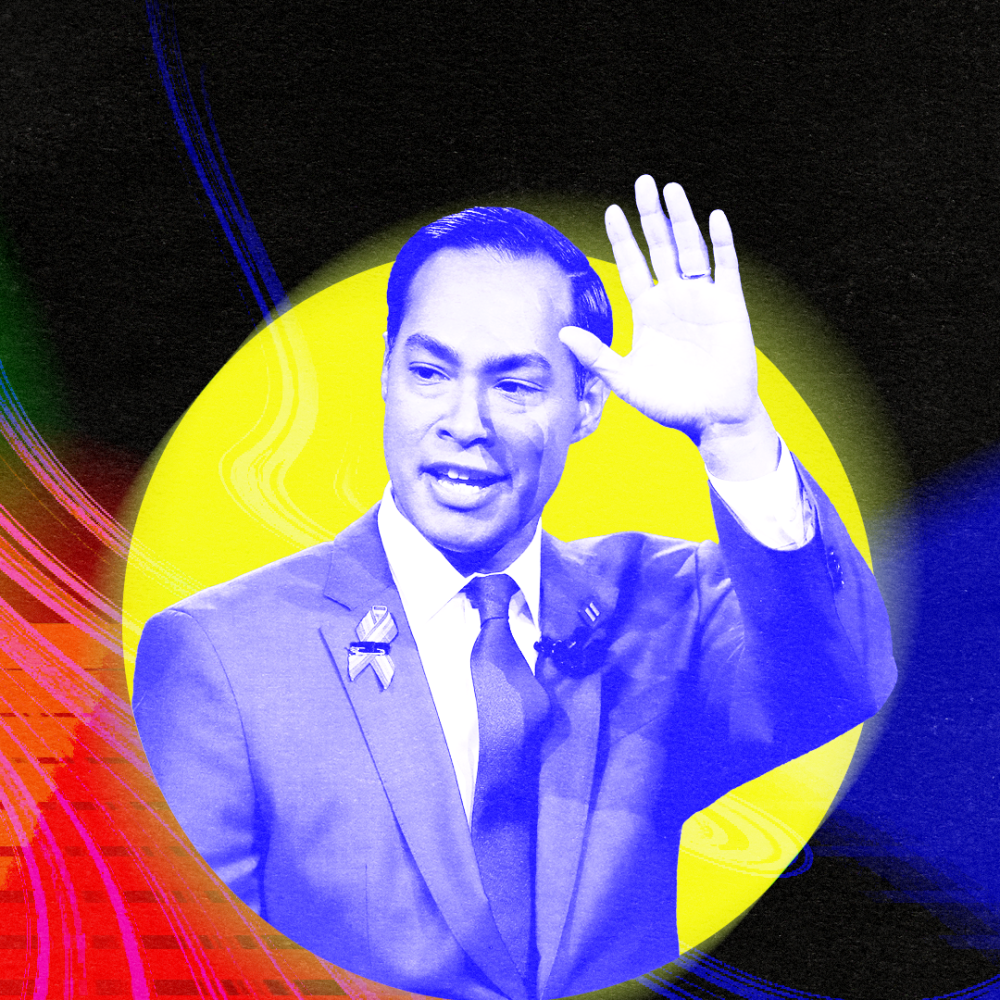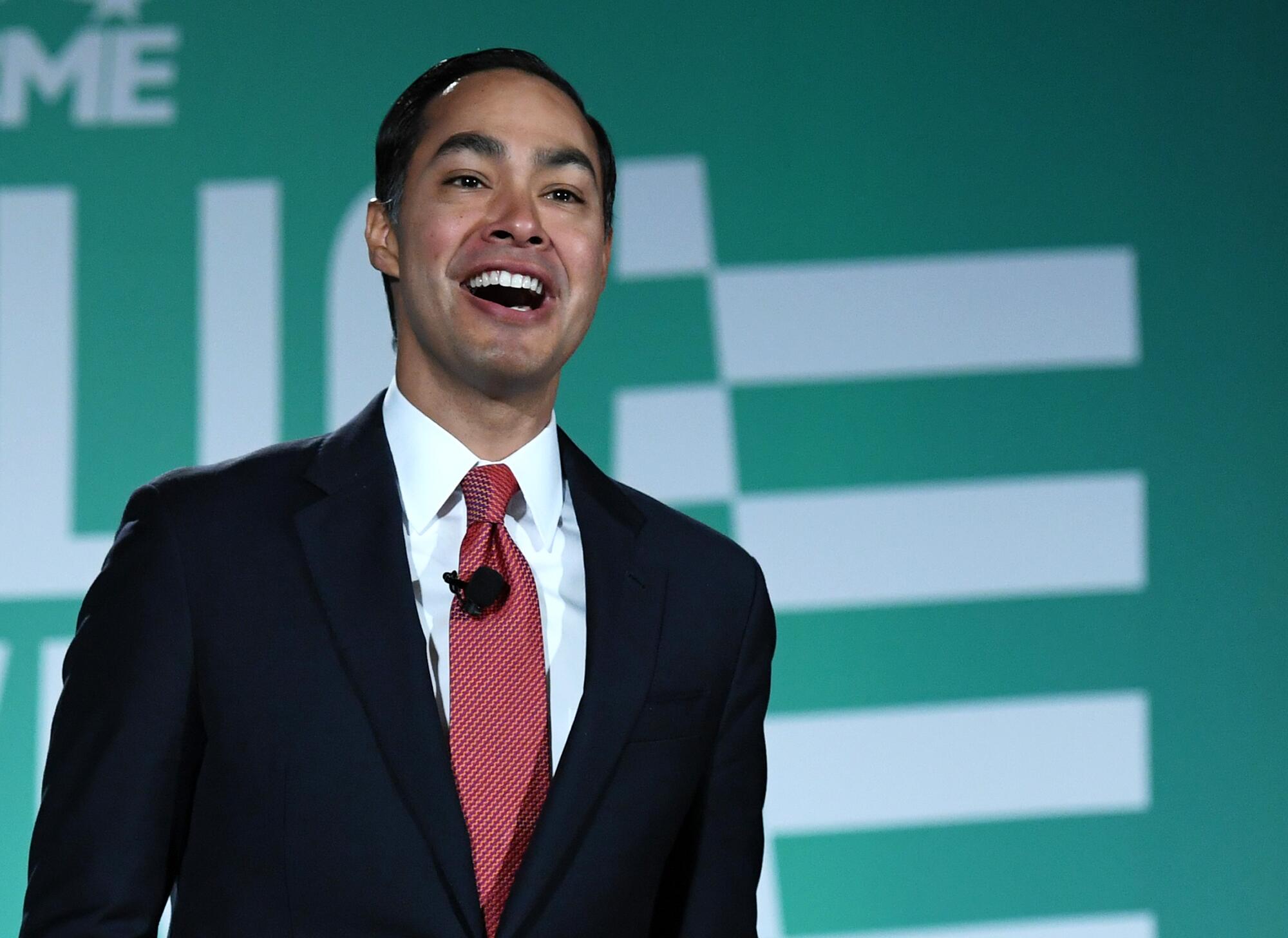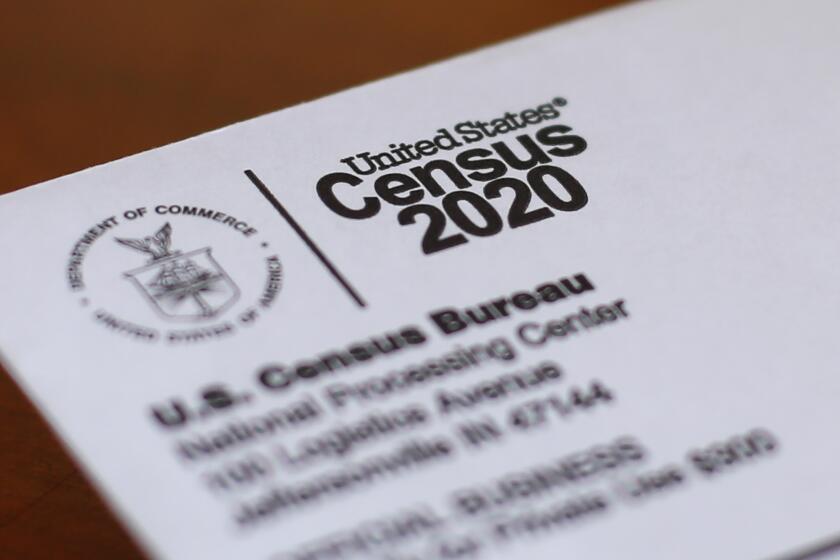
- Share via
Julián Castro will be spending more time in California once he takes the helm as the chief executive of the San Francisco-based Latino Community Foundation, billed as the largest network of Latino philanthropists in the United States.
The foundation announced Castro’s new role early Wednesday, about five months after Jacqueline Martinez Garcel announced she’d be stepping down from the CEO position she has filled since 2015. Martinez Garcel is credited with helping the foundation raise more than $100 million under her leadership.
Last week, Rep. Joaquin Castro sent a list of 27 Latino films to the National Film Preservation Board for consideration for the National Film Registry.
“It’s a unique organization and it’s grown tremendously over these last several years,” said Castro, the former U.S. secretary of Housing and Urban Development. “What intrigues me is, how can the LCF keep doing great work in California, and then expand beyond California?”
Castro begins his new post Jan. 1. He’ll remain based in Texas, but he said: “I’m going to be spending a lot of time in California.”
Founded in 1989, the Latino Community Foundation began as an affinity group of United Way of the Bay Area to increase workplace donations to Latino organizations. In the early 2000s it morphed into a supporting organization of the San Francisco Foundation. The LCF became an independent statewide foundation once Martinez Garcel stepped in.

Since then, the foundation says it has invested more than $29 million in more than 375 nonprofits that are predominantly led by Latinos across the state. It provides branding and fundraising support to grassroots nonprofits and also mobilizes Latino voters.
The foundation has also leveraged American Rescue Plan dollars toward groups such as the Center for Farmworker Families, the Dolores Huerta Foundation, Latinas Contra Cancer and Alianza Coachella Valley.
The LCF has established a Giving Circle network in which each member of a circle contributes a minimum of $1,000 a year, according to its website. Members of these circles include baby boomers, millennials, CEOs, emerging professionals, first-generation college students, immigrants, Latinos and non-Latinos.
The foundation says it has mobilized more than 500 people through this network, in which each Giving Circle decides where to invest its collective resources. The Latinos in Tech and the LGBTQ Latinx giving circles are examples of the funding groups that exist in Los Angeles, Orange County and San Francisco, as well as in the Central Valley.
Politics are changing in the Rio Grande Valley. Is it the breakdown of machine politics, or gerrymandering? A return to true Mexican family values, or a betrayal of them?
Now, the foundation is aiming to take its efforts nationwide.
“Over the course of the next several months, and in the coming years, the question is, ‘Where can it be most effective in other places that have big Latino communities?’” said Castro, who heard about the position about three months ago through a recruiting firm.
Castro — who also served as mayor for his native San Antonio — finds it encouraging that the foundation has a presence not just in big cities but also in farm working communities in the Central Valley.
“There are plenty of areas throughout the Southwest, including in Texas, where you have large, hardworking Latino communities — communities of people who are striving, who can benefit tremendously from the kind of partnership that the Latino Community Foundation offers,” said Castro, who in 2020 ran for the Democratic nomination for president.
Martinez Garcel, who was part of the search committee to find her replacement, said Castro was at the top of the list. The foundation sought someone with a national profile who could elevate the organization and accelerate its growth, she said. About 147 people applied.
Recent statistics out of Texas show Latinos outnumbering non-Latino white people in the state. What does that mean, and how do the implications show how we view Latinos in this country?
It came down to Castro’s values, she said, adding that he knows “what it takes for our community to be seen and be visible.”
“The fact that he can resonate with Latinos, not just from California but from Texas, and his time in D.C., can really accelerate this vision of taking the impact of LCF nationally,” said Martinez Garcel, who will stay on board as a senior advisor to help with the transition.
Martinez Garcel said she planned to initially step down in 2020, but she couldn’t bear leaving the foundation during the height of the pandemic.
Looking back at the foundation’s growth, Martinez Garcel said it wasn’t easy raising money. She noted that less than 2% of all philanthropic dollars go to Latino-led organizations.
“But we did it, and the most important thing is that we’ve demonstrated that it can be done,” she said.
To Castro, taking this new position feels like a “full circle moment.”
“My mother was a Chicana activist who instilled in me a sense that you should give back to our community, and I’ve tried to do that during my time in public service,” he said.
“Latinos, I believe, are fundamentally philanthropic people. We do that among our family members, in churches, in all different types of settings,” he added.
The U.S. Census Bureau confirmed what so many of us already knew: The country is becoming increasingly more diverse.
He’s also looking forward to helping mobilize more Latinos to vote.
“The destiny of this country is intertwined with the destiny of the Latino community like never before. America needs Latinos to do well, in order for this country to do well. And America needs Latinos to exercise their voice at the ballot box, in order to ensure that everybody can thrive in this nation,” he said.
Castro added: “Latinos live everywhere now in the country. It’s not just California, and Texas, and Florida. When I think about building up Latino philanthropy, I especially think about taking this beyond California, to so many of those communities that could benefit from more Latinos giving to important causes.”
More to Read
The Latinx experience chronicled
Get the Latinx Files newsletter for stories that capture the multitudes within our communities.
You may occasionally receive promotional content from the Los Angeles Times.












